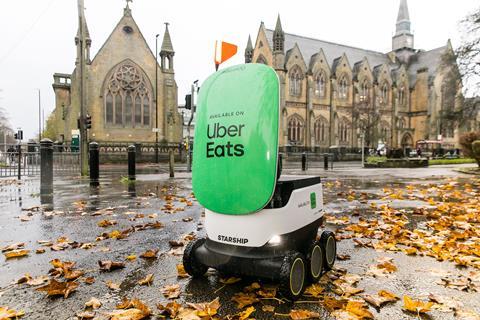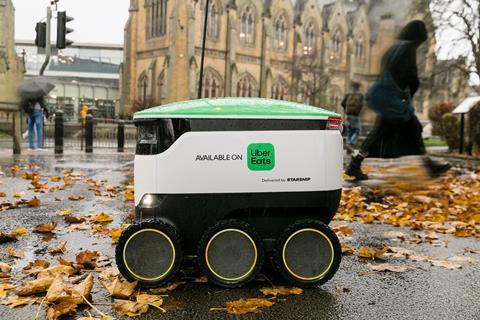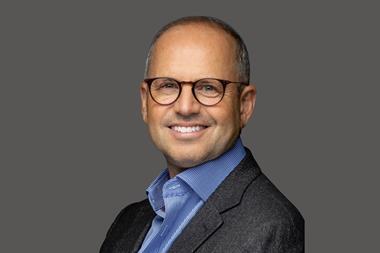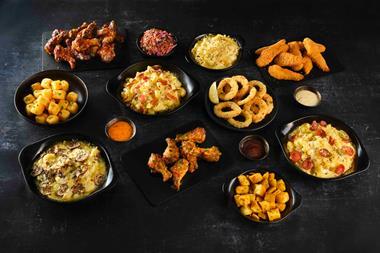
Uber is partnering with robotics company Starship to offer customers autonomous food deliveries in the UK, Europe and US.
The partnership will begin in Leeds next month, before rolling out to Sheffield. The robots will be delivering Uber Eats orders in multiple European regions next year and in the US by 2027.
It is understood around 10 Uber liveried robots will initially roll out in Leeds, with capability to complete deliveries between selected local merchants and residents in under 30 minutes, over distances of up to two miles.
Uber said it “plans to expand the [UK] operating territory in the future”.
“Autonomous delivery is an exciting part of how we see the future of Uber Eats,” said Sarfraz Maredia, global head of autonomous at Uber.
“Together with Starship, we’re bringing this future to life across multiple continents, leveraging Uber’s global scale and Starship’s proven autonomy to deliver efficient and affordable experiences for consumers and merchants everywhere,” Maredia added.

Uber noted that the robots would not accept tips. “However, customers can rate their experience, in-app, just like any typical Uber Eats delivery,” the company said.
Starship operates “the world’s largest autonomous delivery network” it said, boasting a fleet of more than 2,700 robots operating across 270 locations.
The company’s (mostly) self-driving robots have made more than nine million deliveries of takeaway orders and groceries, for partners including Co-op, GrubHub in the US, Delivery Hero’s Foodora in Sweden, DoorDash’s Wolt in Finland and Bolt in Estonia.
Starship’s six-wheeled autonomous robots launched in the UK in 2018, delivering groceries in as little as 15 minutes within a two-mile radius of a Milton Keynes Co-op branch. They’ve since expanded with Co-op to multiple UK cities.
It is understood new robots rolled out under the Uber partnership will fulfil deliveries for Uber Eats orders exclusively, and work alongside any existing Starship services in the area.
Last month, Starship announced it had raised $50m in a funding round, and called for a “clearer regulatory landscape” in the UK for its personal delivery devices, which operate in “a grey area”.
The company – founded in 2014 by Skype co-founders Ahti Heinla and Janus Friis – said it was “committed to manufacturing a state-of-the-art new fleet in the UK if the government acts to clarify regulation”. Starship estimated it would need more than 10,000 new robots to meet demand.
With Uber, Starship is “building the infrastructure that will define the next generation of urban logistics,” said Heinla.
“Uber Eats has built the world’s leading delivery platform, with the widest reach, trusted by millions across 10,000 cities. We bring scalable autonomous technology that works profitably at city scale,” he added.



















No comments yet